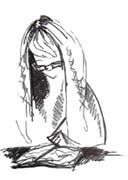 How is it possible that I made it through an entire English program, emerging with a degree and everything, without ever reading Virginia Woolf? And how, despite the several Women's Lit classes under my belt, did I miss A ROOM OF ONE'S OWN?
How is it possible that I made it through an entire English program, emerging with a degree and everything, without ever reading Virginia Woolf? And how, despite the several Women's Lit classes under my belt, did I miss A ROOM OF ONE'S OWN?This skinny, brilliant book needs to be read, again and again, by anybody (man, woman or otherwise) who reads, writes, thinks, or imagines themselves intelligent. I honestly had no idea that Woolf was so articulate, so well-read, so...oh, such an author, and having finished ROOM, I'm now off to by anything ever written by or about her.
I read the book much too fast, and I know there's nothing for it but to come back to it again later. Woolf packs so much insight into her study of women & fiction (I repeat: everybody should read this book. It's not the feminist propaganda it's been made out to be, or I didn't think so, at least) that I don't think I could possibly understand it all, not yet. ROOM is one of those books to be read again every few years (like The Catcher in the Rye), because each year will lend a bit more color to my reading, and each reading, some different different bit of knowledge will step forward and show itself in a new brilliant light.
The conversational tone that Woolf takes (ROOM was originally given as a lecture, if I'm not mistaken) lends the book a very casual feel, as though Woolf were merely thinking out loud--in a much more articulate voice than I ever use when I'm rambling. Perhaps this is only a device she employs to put readers at ease as she explores her somewhat controversial subject, but, for whatever reason she chose, this tone enabled ROOM to come across as more a collection of musings, than as a manifesto.
But by "musings" do I in no way mean to imply that Woolf just jotted down some fluffy, inoffensive thoughts on "Women", and some on "Fiction", and left it at that. Oh, no.
There is something beautifully assertive, and not in the least bit timid, about her writing, no matter how casual she sounds. Her points ring perfectly, without ever resorting to anger or indignation--in fact, Woolf warns against the stain discontent can leave upon otherwise flawless writing:
Now, in the passages I have quoted from Jane Eyre [the scene in which Jane sits up on the roof, and gazes out over the fields, lamenting her confined life], it is clear that anger was tampering with the integrity of Charlotte Bronte the novelist. She left her story, to which her entire devotion was due, to attend to some personal grievance. She remembered that she had been starved of her proper due of experience--she had been made to stagnate in a parsonage mending stockings when she wanted to wander free over the world. Her imagination swerved, and we felt it swerve.Woolf upholds this wonderfully in her own writing (which, as I've said, in my experience so far only contains this book), never swerving, never allowing herself to be diverted by bitterness or frustration, however bitter or frustrated she may have felt while writing A ROOM OF ONE'S OWN--because it would be difficult for any woman to study the condition of women throughout history without feeling at least a little angry.
--p. 73
The book is simply brilliant. Now I must go find Mrs. Dalloway (I keep saying that, don't I? I ought to just do it).
RATING: 5

No comments:
Post a Comment